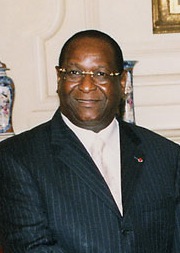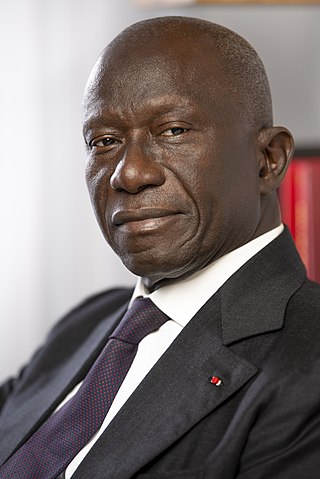| |||||
| Decades: | |||||
|---|---|---|---|---|---|
| See also: | |||||
The following lists events that happened during 2007 in the Republic of Guinea .
| |||||
| Decades: | |||||
|---|---|---|---|---|---|
| See also: | |||||
The following lists events that happened during 2007 in the Republic of Guinea .

Guinea, officially the Republic of Guinea, is a coastal country in West Africa. It borders the Atlantic Ocean to the west, Guinea-Bissau to the northwest, Senegal to the north, Mali to the northeast, Côte d'Ivoire to the southeast, and Sierra Leone and Liberia to the south. It is sometimes referred to as Guinea-Conakry after its capital Conakry, to distinguish it from other territories in the eponymous region such as Guinea-Bissau and Equatorial Guinea. Guinea has a population of 14 million and an area of 245,857 square kilometres (94,926 sq mi).
The modern state of Guinea did not come into existence until 1958, but the history of the area stretches back well before European colonization. Its current boundaries were determined during the colonial period by the Berlin Conference (1884–1885) and the French, who ruled Guinea until 1958.

Politics of Guinea takes place in a framework of a presidential representative democratic republic, whereby the President of Guinea is both head of state and head of government of Guinea. Executive power is exercised by the government. Legislative power is vested in both the government and the National Assembly.

Lansana Conté was a Guinean politician and military official who served as the second president of Guinea, from 5 April 1984 until his death on 22 December 2008. Conté came to power in the 1984 Guinean coup d'état.

Cellou Dalein Diallo is a Guinean economist and politician who was Prime Minister of Guinea from 2004 to 2006. Previously he held a succession of ministerial posts in the government from 1996 to 2004. Currently he is President of the Union of Democratic Forces of Guinea (UFDG), an opposition party. He was a candidate in the 2020 Guinean presidential election but lost to incumbent Alpha Condé.

The Rally of the Guinean People is a political party in Guinea. The RPG was the ruling party in the country from 2010 to 2021 and was recently led by Alpha Condé. It is mainly based amongst the Mandinka population.
Diarra Traoré was a Guinean soldier and politician. He served as Prime Minister of Guinea briefly in 1984 as a member of a junta led by Lansana Conté. In 1985, after Traoré attempted a coup d'état against President Conté, Conté had him executed.

Lansana Kouyaté is a Guinean politician and diplomat who served as Prime Minister of Guinea from 2007 to 2008. Previously he was Executive Secretary of the Economic Community of West African States (ECOWAS) from 1997 to 2002.

The 2007 Guinean general strike began on January 10, 2007. Guinea's trade unions and opposition parties called on President Lansana Conté to resign, accusing him of mismanaging the economy and abusing his authority. The strikers also accused Conté of personally securing the release of Mamadou Sylla and Fodé Soumah, both accused of corruption, from prison.
Mamadou Sylla is a Guinean politician and business leader.
Eugène Camara was a politician from Guinea who was briefly Prime Minister of Guinea in February 2007.
Fodé Soumah is a politician from Guinea.

Abdoul Kabèlè Camara is a Guinean politician and diplomat.
Ahmed Tidiane Souaré is a Guinean political figure who was the Prime Minister of Guinea from May 2008 to December 2008, when he was replaced by Kabine Komara following a military coup d'état.
Military unrest occurred in Guinea in late May 2008 as soldiers of the Military of Guinea demanded wage arrears. In the capital, Conakry, soldiers fired into the air, held the deputy chief of staff of the army prisoner, and engaged in looting. The government promised to pay the soldiers, and by the end of May the situation was reportedly calm.

On 23 December 2008, a coup d'état occurred in Guinea, shortly after the death of long-time president Lansana Conté. A junta called the National Council for Democracy and Development, headed by Captain Moussa Dadis Camara, seized power and announced that it planned to rule the country for two years prior to a new presidential election. Camara did indeed step down after Alpha Condé was elected in the 2010 election.

Kabiné Komara was Prime Minister of Guinea from 30 December 2008 to 26 January 2010. Until the end of 2008 a director at the African Export-Import Bank in Cairo, Egypt, Komara was announced as the new prime minister in a government radio broadcast on 30 December.
Lansana is a given name. Notable people with the name include:
Jean-Marie Doré was a Guinean politician who was the prime minister of Guinea from January 2010 until December 2010. Doré, who was the president of the Union for the Progress of Guinea (UPG), was an opposition leader for years before being chosen to head a transitional government that was in place during the preparation and conduct of the 2010 presidential election.
The following lists events that happened during 2008 in Guinea.